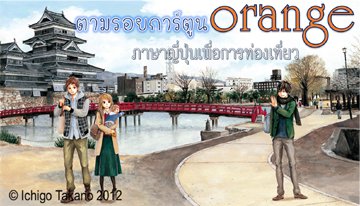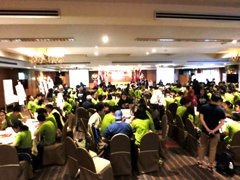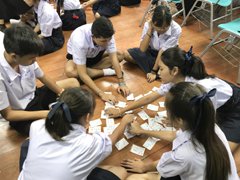Japanese-Language Education in Thailand: Spread out! Gather Together!
The Japan Foundation, Bangkok
HAYAKAWA Naoko, SEKIYAMA Satoshi, OTA Yoshie
Producing the “JF Japanese e-learning Minato” Self-Study Course
“I want to study Japanese”
“But… There is no class nearby,” “I can’t go at a set time,” and “I want to take a freer approach to study.”
“JF Japanese e-learning Minato” is a Japanese-language learning platform for individuals such as this, and it encompasses a variety of Japanese-language learning courses.
At The Japan Foundation, Bangkok we produced an original self-study course known as “Exploring the Stage of Manga Orange A1-A2 (Japanese Tourism).” The course is targeted at Thais with an interest in traveling to Japan and Thais who are studying Japanese, and it comprises two intertwined components – “travel” and “Japanese-language learning.” The “travel” component is a so-called scene search (pilgrimage to sacred places). The concept involves traveling around famous places in Matsumoto City in Nagano Prefecture that were the setting for the “Orange” manga (Ichigo Takano; Futabasha Publishers Ltd.), and taking photos. The “Japanese-language learning” component aims to have the course participants remember simple Japanese phrases and use them during their travels, such as by asking for directions or asking how much something costs.

A course panel on “JF Japanese e-learning Minato”
The language used for explanations is Thai, but it is jointly subtitled in Japanese, so we believe that Japanese people as well as non-Thai Japanese-language learners can study in this course.
Thai International Japanese-Language Camp 2018 Held!
l city of Bangkok over a five-day period from May 1, 2018. This year, 162 high school students and 40 teachers took part from 11 countries – India, Indonesia, Australia, Thailand, Japan, Vietnam, Malaysia, Myanmar, Mexico, Laos and Russia. Various activities were held, centering on the theme of “What is trash? Rise to the challenge together! 3R.”

The International Japanese-Language Camp 2018 in Thailand
On the first day participants studied the current circumstances surrounding trash problems. Following that, the group members shared photographs of trash cans that they had brought from their respective countries to show how trash is disposed of, thus deepening their awareness of the issue. On the second day they took walks through Bangkok while focusing on the trash problem, and then reported how they felt about what they had seen to one another. On the third day each group finally reached a decision on the trash problem they wanted to address, and began considering the causes behind that problem and proposals for improving it that they could achieve themselves. On the fourth day they worked on refining those improvement proposals toward making a final presentation the following day, and on the final day the 20 groups all presented their own improvement proposals. After promising to follow through with those proposals, they said their farewells. The facilitation by the various countries’ teachers was also admirable, and we sincerely hope that it was a highly fulfilling camp not only for the students but for the teachers also.
“NIHONGO Partners” – Providing Grassroots Support for Japanese-Language Education in Thailand
“NIHONGO Partners” is a dispatch program launched in 2014 as a cultural exchange policy connecting Japan and Asia. Japanese nationals from various backgrounds who are aged between 20 and 69 serve as classroom assistants and showcase the Japanese culture in 11 Asian countries, as “partners” to the local Japanese-language teachers and students. Here in Thailand also, up to the previous fiscal year 210 NIHONGO Partners had been dispatched to lower and upper secondary schools across the country, and 80 NIHONGO Partners newly arrived this year also. They are scheduled to carry out their activities for a period of 10 months in their respective places of appointment.

Tackling Karuta, (traditional Japanese playing cards) under the guidance of a NIHONGO Partner
Since NIHONGO Partners began being dispatched, there has been a sudden increase in schools that have taken part in and won prizes at Japanese-language contests, schools that have taking up the Japanese language, and schools that have added Japanese as a subject of major study. Furthermore, because the presence of Japanese people is in itself rare in some regional cities, NIHONGO Partners are expected to be proactively involved with their communities. A large number undertake grassroots activities that contribute to their areas, including setting up small private classes for local children and visiting elementary schools to give Origami (paper craft) lessons.
Japanese-language education in Thailand still has considerable room to grow. “NIHONGO Partners” are solidly performing a role in that also, by supporting Thai teachers and students and spreading knowledge of “Japan” among the wider community.
- What We Do Top
- Arts and Cultural Exchange [Culture]
- Japanese-Language Education Overseas [Language]
- Japanese-Language Education Overseas [Language] Top
- Learn Japanese-language
- Teach Japanese-language
- Take Japanese-Language Test
- Know about Japanese-language education abroad
- The Japanese-Language Institute, Urawa
- The Japanese-Language Institute, Kansai
- Japanese-Language Programs for Foreign Specified Skilled Worker Candidates
- Japanese Language Education for Japanese Children Resident Overseas and for the Descendants of Migrants
- Archives
- Japanese Studies and Global Partnerships [Dialogue]
- JF digital collection
- Other Programs / Programs to Commemorate Exchange Year
- Awards and Prizes
- Publications
